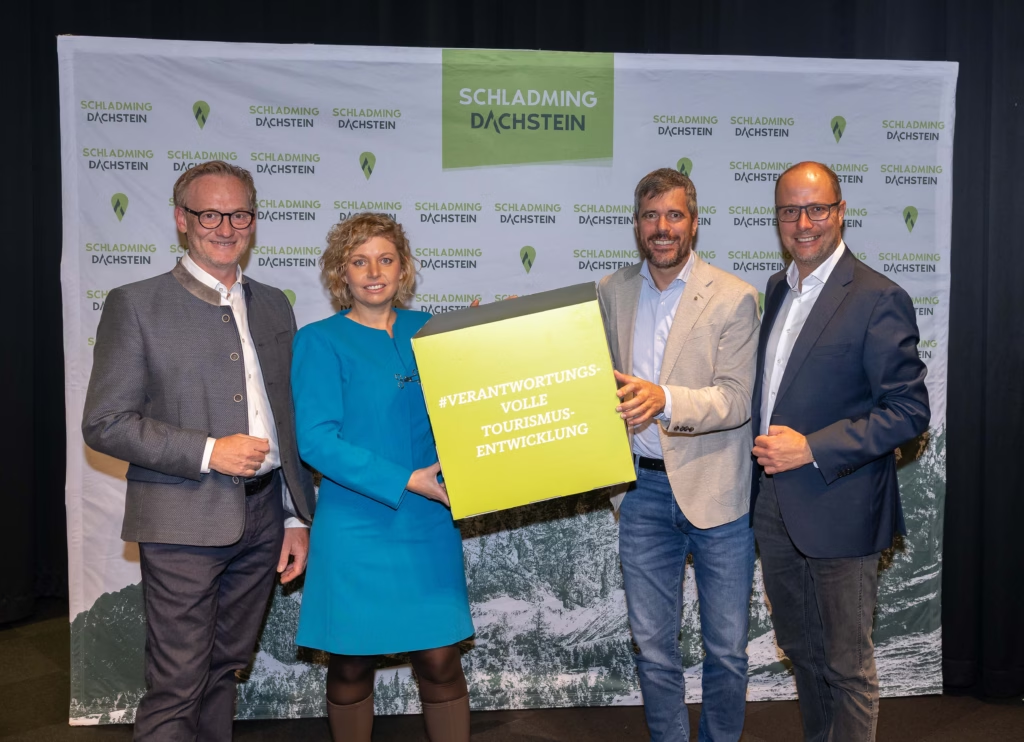Climate change, societal changes, and economic and ecological challenges pose major challenges for the entire tourism industry, and thus also for the Styrian region of Schladming-Dachstein. But where there are challenges, there are also opportunities – and the region has several of them.

To actively shape the path to responsible tourism development, the Schladming-Dachstein Tourism Association presented its "Roadmap 2035" at the tenth Tourism Dialogue at the Schladming Congress Center. Around 300 guests accepted the invitation and enjoyed a truly interesting event.
What was special about the anniversary edition of the Tourism Dialogue was that the Tourism Board not only presented completed strategies, but also opened up the 2035 Roadmap to the attendees once again. Accompanied by a graphic recording team, guests were able to contribute their ideas, thoughts, and suggestions for responsible tourism development and have them visualized in real time. Over the course of the evening, impressive idea walls were created, visualizing the dialogue and stimulating further thought.
Roadmap 2035: Orientation for a responsible future
The Roadmap 2035 is a strategic management tool building on the "Next Level" process initiated last year. It provides a common guide for the path to a responsible future – for the region, its people, businesses, and guests. It is based on twelve thematic areas that summarize key challenges, trends, and opportunities. These were identified in a participatory process. The goal is long-term, responsible tourism development that is economically viable, ecologically sound, and socially effective.
Positioning as an authentic year-round destination
Schladming-Dachstein positions itself as an authentic year-round destination that combines regional identity, closeness to nature, and quality with responsibility and innovation – for guests, locals, and businesses alike. Andreas Keinprecht, Chairman of the Schladming-Dachstein Tourist Board, emphasized the importance of cooperation: "Responsible tourism development only works together. That's why it was important to us not just to present at this year's Tourism Dialogue, but to truly engage with the people of the region and incorporate their perspectives. We all want to avoid leaving the future to chance, but rather develop it together responsibly and with foresight."
“A commitment to our responsibility for this region”
"The Roadmap 2035 is more than a strategy paper—it's a commitment to our responsibility for this region," emphasized Mathias Schattleitner, Managing Director of the Schladming-Dachstein Tourist Board. "We want to further develop tourism in such a way that it creates real added value for our guests, our businesses, and, above all, for the people who live here. The roadmap is not a rigid document, but a living process that we are shaping together with businesses, partners, and the local community."
Impulses from renowned experts
Two renowned experts provided valuable professional input. Michaela Hölz, an expert in sustainable development in tourism with a focus on Alpine destinations, actively supported the development of the roadmap. She emphasized: "Responsible tourism development should not pit the economy against living or natural spaces, as unfortunately often happens in the sustainability discourse, but rather consider all stakeholders and emphasize the qualities and potential of the shared economic and living space." Ski tourism researcher Günther Aigner focused on the future of skiing: "Two findings make me particularly optimistic: Skiing has fascinated people for thousands of years. And fortunately, it is more ecological than previously thought."
Further information is available at www.schladming-dachstein.at.